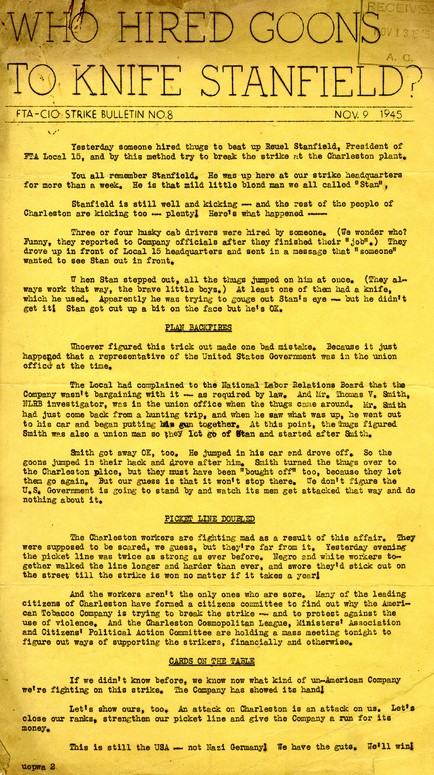The Charleston Cigar Factory Strike was a labor strike that involved workers at the Charleston Cigar Factory in Charleston, South Carolina, from October 22, 1945, to April 1, 1946. The strike resulted from the company refusing to institute raises and racial discrimination. The modern version of the gospel hymn and civil rights anthem that would become popular in the 1960s, We Shall Overcome, was first performed by striking worker Lucille Simmons, during the strike.
The strike began on October 1, 1945, when Harold F. McGinnis, manager of the Cigar Factory, fired a Black male worker after a White female supervisor accused him of taking familiarities with Black female workers. Most of the Black women workers at the factory, who comprised 60% of the workforce, viewed the firing as racially motivated.
In response, Reuel Stanfield, a Black union organizer with Local 15 of the Food, Tobacco, and Allied Workers (CIO), organized a sit-down strike on October 3, 1945. Over the next two days, approximately one hundred Black workers remained idle at their workstations in protest. The next day, around 900 hundred African Americans walked off their jobs after management fired the one hundred Black workers for the previous day’s protest.
By October 22, 1945, over 1,000 Cigar Factory workers had left their jobs, demanding back pay and a pay increase of twenty-five cents per hour. They also sought non-discrimination clauses in the Cigar Factory’s hiring and firing practices, paid medical benefits, and a closed union shop that would require union membership as a condition for employment. By this point, some African American men and White male and female workers joined the strike.
Picket lines were established outside the factory as striking workers carried placards stating their demands and sang spirituals. During the strike, one Black worker, Lucille Simmons, sang a gospel song, We Shall Overcome, to signal the end of the day for picketing strikers. Throughout the strike, pickets faced harassment by the police, white segregationists, and strikebreakers. On October 26, 1945, a rare racially integrated meeting was held at the Morris Street Baptist Church, a Black church, to discuss workers’ concerns.
When progress stalled, Stanford and other union leaders lodged a complaint with the National Labor Relations Board (NLRB). In response, NLRB official Thomas V. Smith came to Charleston on November 8, 1945, to investigate the case. While he was there, four men attacked Stanford at Union headquarters, gashing his face with a knife. Smith witnessed the attack and reported it to the local police, but the officers released the four attackers without filing charges. Smith and the NLRB ruled in favor of Local 15 and ordered the company to repay the workers $120.00 in back pay.
The strike continued, however, and on November 15, 1945, a massive demonstration occurred in front of the Cigar Factory office, involving more than one thousand Black and White workers. This was the most significant labor demonstration in Charleston’s history. Finally, on April 1, 1946, company officials agreed that workers would receive back pay, a pay raise of 8 cents per hour, and reduced racial barriers to skilled positions.
Do you find this information helpful? A small donation would help us keep this available to all. Forego a bottle of soda and donate its cost to us for the information you just learned, and feel good about helping to make it available to everyone.
BlackPast.org is a 501(c)(3) non-profit and our EIN is 26-1625373. Your donation is fully tax-deductible.
“The Cigar Factory Strike,” Lowcountry Digital History Initiative, https://ldhi.library.cofc.edu/exhibits/show/cigar_factory; “The Cigar Factor Strike,” Preservation Society of Charleston,https://www.preservationsociety.org/locations/cigar-factory-strike/; “The Cigar Factory Strike,” The Historical Maker Database, https://www.hmdb.org/m.asp?m=67363
Your support is crucial to our mission.
Donate today to help us advance Black history education and foster a more inclusive understanding of our shared cultural heritage.

